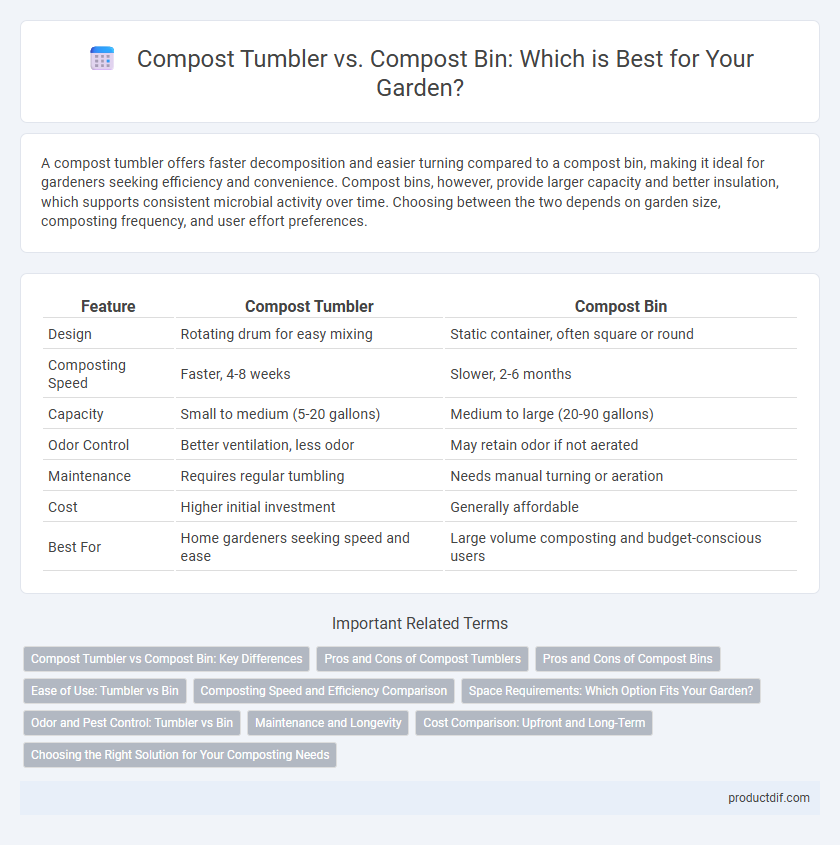A compost tumbler offers faster decomposition and easier turning compared to a compost bin, making it ideal for gardeners seeking efficiency and convenience. Compost bins, however, provide larger capacity and better insulation, which supports consistent microbial activity over time. Choosing between the two depends on garden size, composting frequency, and user effort preferences.
Table of Comparison
| Feature | Compost Tumbler | Compost Bin |
|---|---|---|
| Design | Rotating drum for easy mixing | Static container, often square or round |
| Composting Speed | Faster, 4-8 weeks | Slower, 2-6 months |
| Capacity | Small to medium (5-20 gallons) | Medium to large (20-90 gallons) |
| Odor Control | Better ventilation, less odor | May retain odor if not aerated |
| Maintenance | Requires regular tumbling | Needs manual turning or aeration |
| Cost | Higher initial investment | Generally affordable |
| Best For | Home gardeners seeking speed and ease | Large volume composting and budget-conscious users |
Compost Tumbler vs Compost Bin: Key Differences
Compost tumblers offer faster decomposition by allowing easy turning of organic material, which enhances aeration and speeds up the composting process compared to compost bins. Compost bins provide a larger capacity for bulk composting but require manual mixing and may take longer to break down materials. Choosing between a compost tumbler and a compost bin depends on space availability, composting speed preferences, and ease of maintenance.
Pros and Cons of Compost Tumblers
Compost tumblers offer faster decomposition due to improved aeration and easy turning, reducing the effort required to mix materials compared to traditional compost bins. They are ideal for small spaces and help keep pests away, but tend to have a smaller capacity and higher cost than standard bins. Limited moisture control and the need for regular manual rotation can be challenging for maintaining optimal compost conditions.
Pros and Cons of Compost Bins
Compost bins offer a simple, cost-effective solution for garden waste decomposition, providing controlled conditions that minimize odor and pests. They require minimal maintenance but can slow the composting process due to limited aeration compared to tumblers. Their larger size supports higher volume composting, making them ideal for gardeners with ample space and bulky organic waste.
Ease of Use: Tumbler vs Bin
Compost tumblers offer superior ease of use with their rotating design, which makes turning and aerating compost effortless, reducing manual labor. Compost bins often require manual mixing with a pitchfork or garden tool, making the process more time-consuming and physically demanding. For gardeners seeking convenience and faster decomposition, tumblers provide a more user-friendly composting experience compared to traditional bins.
Composting Speed and Efficiency Comparison
Compost tumblers accelerate decomposition by providing better aeration and easier turning, resulting in faster composting cycles that can be completed within weeks. In contrast, compost bins rely on natural microbial activity and manual turning, often taking several months to produce finished compost. The enhanced oxygen flow and consistent mixing in tumblers improve efficiency by promoting rapid breakdown of organic matter compared to the slower, less controlled environment of traditional bins.
Space Requirements: Which Option Fits Your Garden?
Compost tumblers require less ground space, making them ideal for small gardens or patios where space is limited. Compost bins, often larger and stationary, are better suited for spacious gardens with room for extended composting processes. Choosing between the two depends on available garden space and composting volume needs.
Odor and Pest Control: Tumbler vs Bin
Compost tumblers offer superior odor and pest control by sealing waste inside a rotating drum, limiting exposure to air and pests while accelerating decomposition through frequent mixing. Traditional compost bins often have open sides or vents that can allow odors to escape and attract pests like rodents and insects. Effective compost management with tumblers reduces odor buildup and minimizes pest infestations by maintaining a controlled, enclosed environment.
Maintenance and Longevity
Compost tumblers require regular turning to maintain aeration and speed up decomposition, making maintenance more active but efficient. Compost bins typically need less frequent mixing but can experience slower breakdown and potential odor buildup if not monitored. Tumblers tend to have a longer lifespan due to durable materials like heavy-duty plastic or metal, while bins may degrade faster from exposure to weather conditions.
Cost Comparison: Upfront and Long-Term
Compost tumblers generally have a higher upfront cost ranging from $80 to $200 due to their rotating design and durable materials, while compost bins often cost between $30 and $100. Over the long term, tumblers may save money by accelerating decomposition, reducing waste volume faster, and lowering the need for pest control, but bins require less maintenance and no mechanical parts, resulting in minimal ongoing expenses. Considering durability, efficiency, and maintenance costs is essential when comparing the total financial investment of compost tumblers versus compost bins.
Choosing the Right Solution for Your Composting Needs
Compost tumblers offer faster decomposition through regular aeration and are ideal for small to medium gardens needing quick nutrient-rich compost. Compost bins provide a more traditional, slower composting process, suitable for larger organic waste volumes and gardeners seeking low-maintenance options. Selecting between a compost tumbler and compost bin depends on your garden size, composting speed preference, and ease of use requirements.
Compost tumbler vs Compost bin Infographic

 productdif.com
productdif.com